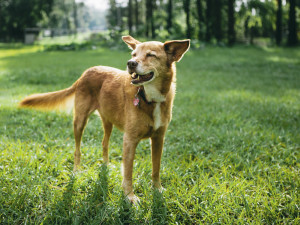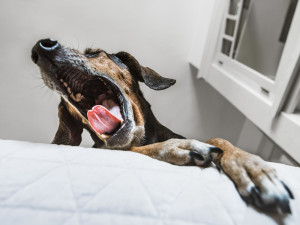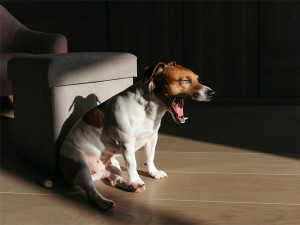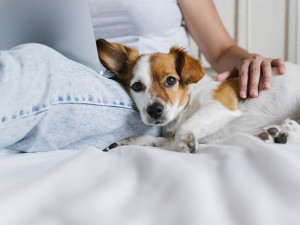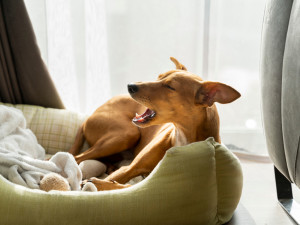Why Do Dogs Sneeze?
And what can I (or should I) do when my dog keeps sneezing?
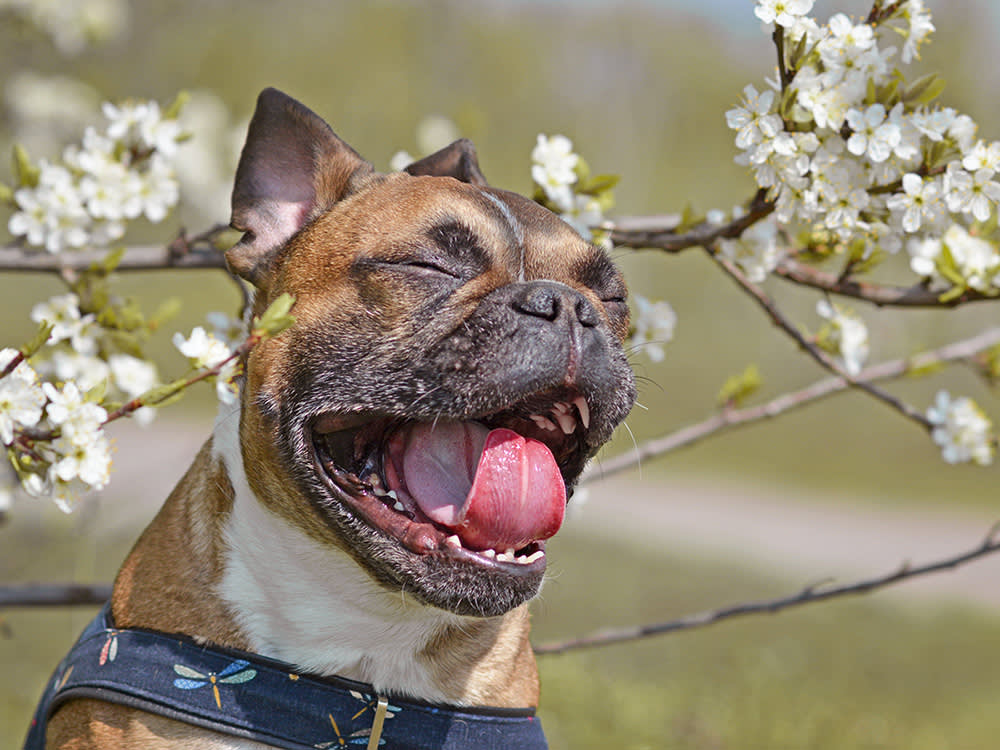
Share Article
Your dog’s sense of smell is their superpower – they use their nose to decipher the world. So, it’s no surprise that, like people, they occasionally sneeze. Random sneezes aren’t necessarily something to be concerned about, but a dog sneezing a lot may be a sign of a health condition requiring medical attention.
Uncontrollable or excessive sneezing in dogs can be caused by something as simple as pollen, household products (another reason to always use pet-safe versions), perfume and second-hand smoke; or water inhaled while swimming or during a bath. Dogs will even sometimes sneeze when they’re excited, or during play. While it’s likely that your dog’s sneezing is nothing to worry about, some dog sneezing should definitely be paid attention to and treated by a veterinarian as soon as possible.
How sneezing works
Most of the time, sneezing is the result of a transitory irritation of a dog’s nasal passages. When your dog sneezes, it’s the body’s way of dislodging or expelling the irritant. If that irritant is small, say, a stray bit of leaf, a snip of freshly cut grass or some other small object that gets hoovered up during your dog’s investigation of their environment, a sneeze or two is usually enough to do the trick. However, that’s not always the case.
If your sneezing dog has nasal swelling, a persistent runny nose, nose bleeds, or is pawing at their nose, have your vet check them out without delay. Read on for the most common reasons your dog might be sneezing all the time.
8 reasons why your dog might keep sneezing
Dog play sneezing
Is your dog sneezing when excited? When your dog is having fun rollicking with their pals, they might be doing something called play sneezing. Sometimes a dog will sneeze to signal to other dogs that they’re ‘just playing’ or it’s ‘just a game’, and it’s completely normal. Dogs may sneeze when they’re zooming in the garden, from the sheer joy of it (smaller dogs are more likely to do this), but it’s nothing to worry about.
Reverse sneezing
Then there’s reverse sneezing, which really isn’t a sneeze at all – it’s a sneeze that sounds more like a honk. Vets call it inspiratory paroxysmal respiration, and it’s brought on by a muscle spasm at the back of a dog’s mouth, where the mouth meets the throat. The spasm makes it hard for the dog to inhale. Interestingly, many of the same things that set off other sneezing fits as described in this article will also trigger reverse sneezes.
Plant material
If your dog has snuffled up a grass seed, even repeatedly sneezing probably won’t expel it. Grass seeds such as foxtails are engineered to transfer from the plant to a host faster than the speed of light, embed and then migrate, which they do in only one direction: forwards.
If your dog is unlucky enough to inhale a grass seed, they’ll most likely sneeze like mad for a full few minutes, then stop. Most of us will then think that they sneezed it out, but sometimes, that’s not true. Instead, it may mean that the foxtail has already travelled further up the nasal cavity. You might even notice a tiny little drop of blood appear on the tip of the nostril.
It’s a good idea to leave the area, keep your dog calm and observe them closely. Unfortunately, detecting a foxtail in a dog’s nostril can be both difficult and painful and most dogs aren’t going to let you probe around looking for it. If you believe your dog has inhaled a grass seed, a vet visit is definitely in order, and ASAP. The longer you wait, the more challenging (and costly) removing the seed will be.
Dog allergies
Just like us, a dog can have seasonal allergies. Plant or grass pollen, dust mites, and certain household chemicals are the most common culprits for allergy-related dog sneezing. Dogs who have allergies often are more prone to skin and ear infections as well. Talk with your vet about the best ways to treat these allergies.
Dog nasal and respiratory infections
Frequent sneezing sometimes signals an infection caused by a virus, bacteria or fungi. Viruses (including distemper and parainfluenza) can cause a dog to sneeze. Bordetella is one of the bacteria that causes kennel cough, as well as sneezing. Aspergillosisopens in new tab is a common nasal infection caused by inhalation of aspergillus mould, which can be found almost anywhere. Other inhaled fungi, such as cryptococcus and blastomycosis, also affect a dog’s respiratory system and will cause sneezing. All of these are treatable and can be diagnosed (or ruled out) by a visit to the vet.
Nasal mites
In rare cases, persistent sneezing can be caused by nasal mites. These tiny insects, about only one millimetre in size, are found in dirt and dogs who dig with their noses may contract them this way. These mitesopens in new tab, which can be very irritating to dogs, are contagious and require treatment. Your vet may prescribe topical or oral medication to eliminate and prevent nasal mites.
Canine nasal cancer
A cancerous tumour in a dog’s nasal passageopens in new tab is sometimes the cause of excessive sneezing. Nasal cancer makes up 1–2 percent of cancers in dogs and has an 80 percent malignancy rate. While, like most cancers, there’s no known single cause, it’s thought that this cancer has both environmental (second-hand cigarette smoke, for example) and genetic origins. Longer-snouted breeds like Collies and Dachshunds are the most susceptible.
In addition to sneezing, symptoms of nasal tumours include difficulty breathing, noisy breathing, bloody nasal discharge, coughing, loud snoring, seizures and facial swelling. Needless to say, if your dog exhibits some or most of these symptoms, they should be checked out by your vet ASAP.
Canine dental problems
While it may not seem like an obvious cause, canine dental problems such as infected teeth or gums and abscesses can create an infection in the nasal cavities, causing a runny nose and sneezing.
Breeds prone to sneezing fits
There are also structural reasons for some dogs’ snorting and sneezing. The nasal passages of brachycephalic breeds – short-muzzled types like Bulldogs, Pugs and Boston Terriers – are compressed, which leads to a fair amount of sneezing, snoring and snorting. In fact, dogs of these breeds can have a condition known as brachycephalic airway obstruction syndromeopens in new tab (BAOS); sneezing is one of the symptoms associated with BAOS.
Don’t ignore these symptoms
If your sneezing dog has nasal swelling, a persistent runny nose or nose bleeds or is pawing at their nose, there’s likely to be an underlying reason. Have your vet check them out without delay.

Claudia Kawczynska
Claudia Kawczynska was co-founder and editor-in-chief of The Bark for 20 years. She also edited the best-selling anthology Dog Is My Co-Pilot.
Related articles
![A dog outside with his mouth open coughing]()
Laryngitis in Dogs: Causes and Treatment
Vet advice on when you should be worried about your dog’s cough
![A dog with its eyes closed and mouth open sitting on a hardwood floor.]()
How to Help a Choking Dog and Prevent Choking in the First Place
Learn about the causes and what to do for a choking dog
![Dog sitting next to owner]()
DIY Pet Physical Exam: How to Check Your Dog’s Breathing & Skin
Veterinarian Dr Shea Cox on how to get comfortable checking your dog’s breathing, respiratory rate and skin hydration
![Dog laying down in dog bed and coughing]()
When a Cough Isn’t Just a Cough
Seven reasons to be concerned when your dog is coughing, according to veterinarians

